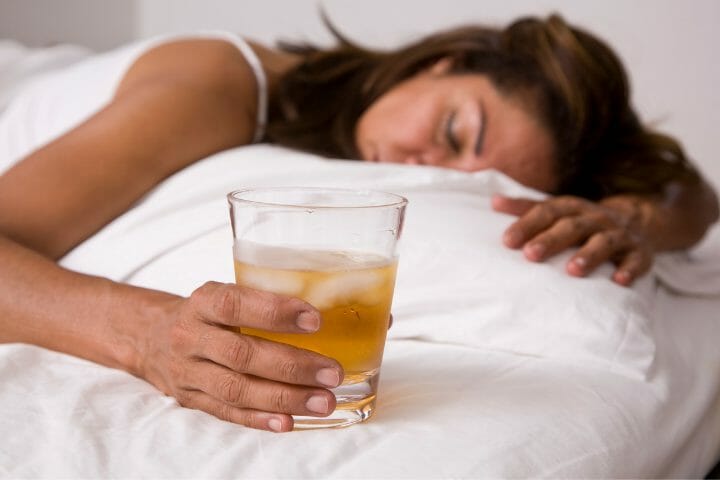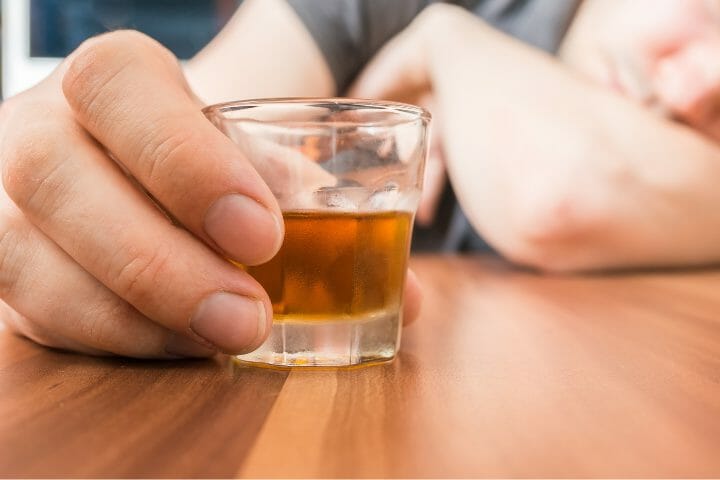Alcoholism comes with a host of other mental and physical limitations. But can you get disability for alcoholism? The answer is yes, but not for alcoholism per se – you can get disability benefits for the related conditions. Read on to find out.
Contents
There is a lot of debate over whether or not alcoholism can be classified as a disability. While some people may argue that addiction is a personal choice, others would say that it is a disease that requires treatment.
There are a lot of factors that come into play when trying to decide if an individual is disabled, and alcoholism certainly falls into a gray area. A vast percentage of people in the United States consumes alcohol every day. And amongst them, almost 5.3% of drinkers suffer from Alcohol Use Disorder.

If you are struggling with alcoholism and feel like you can’t manage independently, you may be wondering if you could qualify for disability benefits. Here, we will look at the criteria for disability and how alcohol addiction might fit in.
What is Alcoholism?
Alcoholism is a chronic and progressive drinking disorder where you have problems controlling your drinking or having withdrawal symptoms when you stop or rapidly decrease drinking.
Alcoholism can damage your health, career, and personal relationships. It can lead to legal problems, such as being arrested for driving drunk or getting into fights. If you are an alcoholic, you may not realize how much harm your drinking is causing. Denial is a common symptom of alcoholism.

Disabilities caused by alcoholism
There are a variety of disabilities that can be caused by alcoholism. These can include physical disabilities, cognitive disabilities, and mental health disorders.
- Physical disabilities caused by alcoholism may include liver damage, cardiovascular disease, and nerve damage. These conditions can lead to a loss of physical function and mobility.
- Cognitive disabilities caused by alcoholism may include memory problems, difficulty thinking clearly, and impaired judgment. These difficulties can make it hard to keep a job or take care of day-to-day responsibilities.
- Mental health disorders caused by alcoholism include depression, anxiety, and post-traumatic stress disorder (PTSD). These conditions can make it difficult to cope with the stress of everyday life.
You might also like to read: Can You Get Disability If You’ve Never Worked?
Can You Get SSA Disability Benefits for Chronic Alcoholism?
Yes, you can get disability benefits for chronic alcoholism, but not based on the alcohol abuse itself. The Social Security Administration (SSA) may not consider you disabled based on your diagnosis of chronic alcoholism alone.
However, many people who suffer from this condition have physical or behavioral limitations that inhibit their ability to fully-function in a work situation caused by alcohol use.
SSA will determine if you are disabled and have medical evidence of your alcohol addiction. The SSA will not treat these claims negatively because they result from excessive drinking patterns over time. However, the key requirement is that your alcoholism should not be contributing to the disease on an ongoing basis, meaning that the disease would still exist even if you stopped drinking.

When Is Alcoholism Considered a Disability?
There is no one-size-fits-all answer to this question, as alcoholism can be considered a disability in various ways. For example, some people may view alcoholism as a disability because it can prevent someone from being able to hold down a job or function in society.
Others may consider it a disability because it can lead to serious health problems, including liver damage and addiction.
In general, alcoholism is only considered a disability if it significantly impairs someone’s ability to live everyday life. You can overcome this disease and lead a healthy and productive life with the proper treatment and support. If you are struggling with alcoholism, it is essential to seek help from a qualified medical professional to ensure that your condition does not spiral out of control.

Qualifying for Disability for a Substance Abuse Disorder
If you or someone you care about is struggling with a substance addiction disorder, you may be wondering if it’s possible to qualify for disability benefits. The answer is yes, but specific criteria must be met for an individual to be eligible.
Substance addiction disorders can profoundly affect an individual’s ability to function in everyday life. To qualify for disability, the condition must severely limit at least one significant life activity or cause an inability to perform basic work activities.
In addition, individuals must have a documented history of their condition and how it has impacted their ability to function. This can include medical records, treatment plans, and other documentation supporting the diagnosis.
You might also like to read: Can You Get Disability With A Felony?
How Does Social Security Evaluate Disability When Alcoholism Is A Contributing Factor?
Alcoholism in itself is not enough to get your social security disability benefits. If this is the basis of your entire case, the SSA will reject your disability claim. However, if alcoholism contributes to other functional limitations that meets Social Security’s definition of disability, you may be eligible for benefits.
Your alcohol-related impairment must be severe enough to prevent you from doing substantial work to receive benefits. Additionally, your alcohol-related impairment must be supported by medical evidence from a qualified medical source. This evidence can include:
- A detailed description of your symptoms
- Information about how your symptoms affect your ability to function
- Documentation of prior treatment for alcoholism, including hospitalizations
Suppose you have an alcohol-related impairment that isn’t expected to improve if you quit drinking and meets or equals a listing in the Social Security Administration’s determination of disability. In that case, you will automatically qualify for benefits.
Here is a list of such disorders:
- Anxiety Disorders and other mental disorders
- Depressive Syndrome
- Cirrhosis and other liver diseases
- Gastritis
- Pancreatitis
- Peripheral Neuropathies and others.
Suppose your impairment doesn’t meet or equal a listing. In that case, Social Security will consider your age, education, past work experience, and any transferable skills you have when determining if you can adjust to other work.

Treatments For Drug Addiction and Alcoholism
Drug addiction and alcoholism are serious problems that can profoundly affect every aspect of your life. If you or someone you care about is struggling with an addiction, it’s essential to get help as soon as possible.
There are many different types of treatment available for drug addiction and alcoholism, and the right approach depends on each individual’s unique situation. However, there are general principles that all effective treatment programs share.
- The first step in any successful treatment program is detoxification, eliminating all drugs and alcohol from your body. This can be a difficult and sometimes dangerous process, so it’s essential to do it under the supervision of a medical professional.
- After detox, the next step is usually some form of counseling or therapy. This can help you understand the root causes of your addiction and learn new coping skills to deal with stressful situations without turning to drugs or alcohol.
- In addition to counseling or therapy, many people also benefit from attending a 12-step program like Alcoholics Anonymous or Narcotics Anonymous. These programs provide support and accountability as you work to overcome your addiction.
You might also like to read: Can You Get Disability For Panic Disorder
Can I Get ShortTerm Disability for Alcohol Addiction and Substance Use?
If you suffer from alcohol addiction or substance use, you may be wondering if you can qualify for short-term disability benefits. The answer to this question depends on several factors, including the severity of your condition and whether you can maintain employment while receiving treatment.
In general, to qualify for short-term disability benefits, you must be unable to work for some time due to your condition. However, if you can work with reasonable accommodation or restrictions, you may not be eligible for benefits.
For example, if you are in an inpatient treatment program for alcohol addiction, you would likely not be able to maintain employment and would therefore qualify for benefits.
It is important to note that even if the employee is eligible for short-term disability benefits, the employer may still require you to take a leave of absence from work. This is because addiction and substance use are severe medical conditions that can impact your ability to perform your job duties.
If you’re struggling with an addiction, don’t try to go it alone. Seek professional help and start on the path to recovery today.

Can You Get A VA Disability For Alcoholism?
Veterans can receive disability ratings for alcohol-related conditions as long as the alcoholism was not a product of the veteran’s own “willful misconduct.”
The Veterans Affairs (VA) rates disabilities on a scale from 0 to 100 percent, in 10-percent increments. The severity of the disability will determine the percentage awarded.
A veteran who cannot work due to alcoholism may be entitled to a 100-percent disability. A veteran must have proof of service-connected alcoholism to receive benefits, such as discharge papers showing “alcohol dependence” or “drug addiction.”
A diagnosis from a VA doctor is also required. The VA will not award benefits for conditions that are not service-connected, such as pre-existing alcoholism or alcohol abuse that did not result from the veteran’s military service.

Frequently Asked Questions
1. Do alcoholics get PIP?
A common misconception is that alcoholics are not eligible for disability benefits, including Personal Independence Payment (PIP). However, this is not the case. While specific eligibility criteria must be met to receive PIP, alcoholism is not a disqualifying factor.
There are two main types of PIP: a daily living component and a mobility component. The daily living component is for those who need help with activities such as dressing, washing, or using the toilet. The mobility component is for those who need help walking or moving around.
To be eligible for the daily living component, a person must have difficulty with at least two of the following activities:
Preparing or eating food
Washing themselves
Using the toilet
Dressing themselves
Reading and communicating
Managing their medicines or treatments.
To be eligible for the mobility component, a person must have difficulty with at least one of the following activities:
Planning or following journeys
Moving around outside of the home.
PIP is not means-tested, which means that it is not based on your income or savings. It is also not affected by whether you are at work or not. An independent assessor conducting a face-to-face assessment will assess whether or not you are eligible for PIP. This assessment will look at your ability to carry out activities rather than your diagnosis of alcoholism.
2. Who can get DLA benefits UK?
Disability Living Allowance (DLA) benefits help those who need to cover their cost of care or mobility and are under the age of 16. This benefit is tax free in the UK. To be eligible for Disability Living Allowance (DLA) in the UK, you must:
be under 16 years of age, or
have a physical or mental disability that significantly affects your ability to carry out day-to-day activities, and
require substantial care and supervision due to your disability.
If you are 16 years of age or over, you may also be eligible for DLA if you:
have a physical or mental disability that has lasted, or is expected to last, for at least 12 months, and
require substantial care and supervision due to your disability.
In addition, you must ordinarily reside in the UK, the Channel Islands, or the Isle of Man. And, you must have been present in the UK, Channel Islands, or the Isle of Man for at least 2 of the three years before you make your claim.
Wrap Up
Alcoholism can severely affect your ability to think, act and work in a normal manner. It often brings with itself several psychological and health related problems. If you are suffering from these problems due to your alcoholism, you are still eligible for disability benefits.
Thank you for reading, we hope we covered all the main topics. If you have other doubts or questions, please leave us a word in the comments section.
